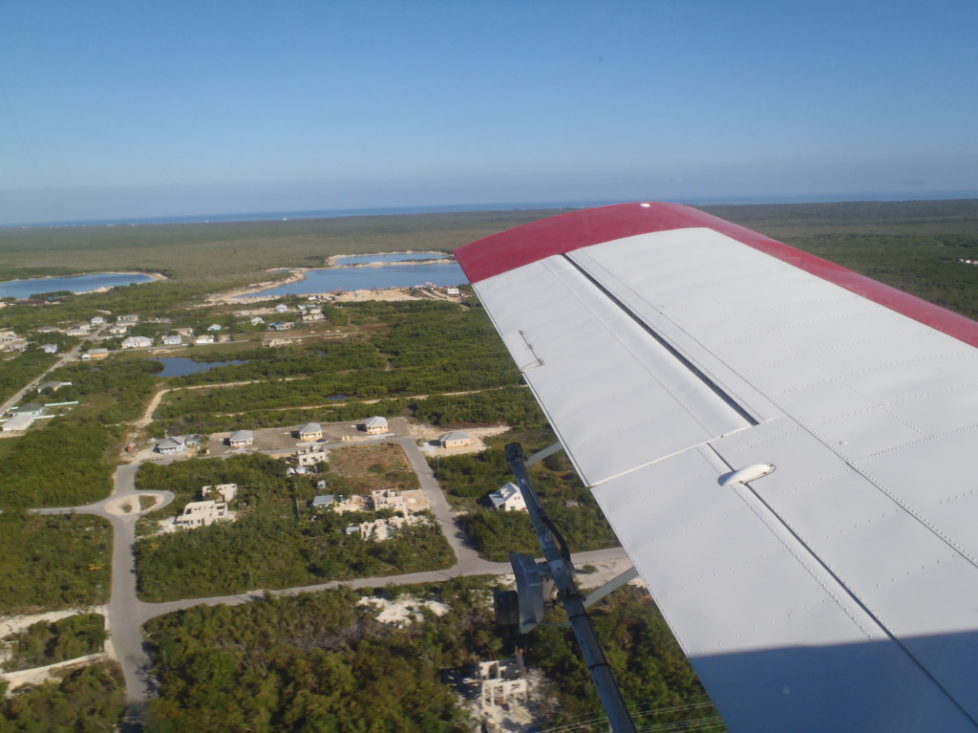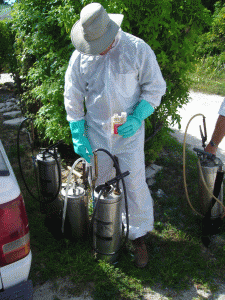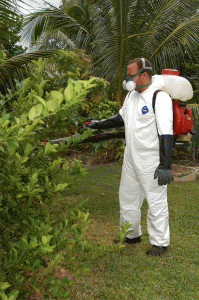
Pesticides Used
Liquid Adulticides Currently in Use
AQUA-RESLIN – active ingredients Permethrin 20%, Piperonyl Butoxide technical 20%
Type – Liquid Adulticide
Manufacturer – Bayer Environmental Science
Address – 95 Chestnut Ridge Rd, Montvale, NJ 07645
EPA registration # 432-796
Material Safety Data Sheet
Product Label
MOSQUITOMIST TWO – active ingredient Chlopyrifos 24.6%
Type – Liquid Adulticide
Manufacturer – Clarke Mosquito Control Products Inc
Address – 159 North Garden Avenue, Roselle IL, 60172
EPA registration # 8329-18
Material Safety Data Sheet
Product Label
Granular Larvicides Currently in Use
ALTOSID PELLETS – active ingredient Methoprene 5%
Type – Residual Larvicide Granules
Manufacturer – Wellmark International
Address 1100 East Woodfield Rd, Suite 500, Schaumburg IL, 60173
EPA registration # 2724-392
Material Safety Data Sheet
Product Label
ALTOSID XR-G – active ingredient Methoprene 1.5%
Type – Residual Growth Regulator Granules
Manufacturer – Wellmark International
Address 1100 East Woodfield Rd, Suite 500, Schaumburg IL, 60173
EPA registration # 2724-421
Material Safety Data Sheet
Product Label
AQUABAC 400G – active ingredient Bacillus thuringiensis subspecies israelensis (Bti)
Type – Single Brood Larvicide Granules
Manufacturer – Becker Microbial Products
Address 11146 NW 69th Place, Parkland FL 33076
EPA registration # – not regulated
Material Safety Data Sheet
Product Label
NATULAR XRG – active ingredients – Spinosad 2.5%
Type – Group 5 Extended release granule
Manufacturer – Clarke Mosquito Control Products Inc
Address – 159 North Garden Avenue, Roselle IL, 60172
EPA registration # 8329-83
Material Safety Data Sheet
Product Label
5% SKEETER ABATE – active ingredient Temephos 5%
Type – Residual Larvicide Granules
Manufacturer – Clarke Mosquito Control Products Inc
Address – 159 North Garden Avenue, Roselle IL, 60172
EPA registration # 8329-15
Material Safety Data Sheet
Product Label
Liquid Larvicides Currently in Use
VECTOBAC WDG – active ingredient Bacillus thuringiensis subspecies israelensis (Bti)
Type – Water Dispersable Granules
Manufacturer – Valent Biosciences Corporation
Address – 870 Technology Way, Libertyville, Il 60048
EPA registration # 73049-56
Material Safety Data Sheet
Product Label
News
Researchers keep up fight against Dengue Fever
Mosquito unit hangar nearly completed
Officials forecast mosquito emergence
MRCU working to control mosquitoes on Cayman Brac
MRCU: Release on modified mosquitoes ‘misleading’ Local dengue fever case confirmed
FAQs
How many different mosquitoes are there?
Globally there are thousands of different types or species of mosquitoes. Here in the Cayman Islands we have reported 36 of them of which we see about 8 on a daily basis
Why are mosquitoes associated with the water?
Mosquitoes lay their eggs in water and the immature stages live in this water until they emerge as flying adults. This is why we urge members of the public to reduce the amount of standing water on their properties as it encourages breeding. In less than a week you can get from egg to fully grown adult.
Why do mosquitoes come out at night?
Generally mosquitoes prefer to fly when it is cooler such as the early evening and night time, choosing to rest out of the drying effects of the sun in the day time. Although not all species bite at night Aedes aegypti the Dengue mosquito is considered a day flying mosquito and bites mostly in the late afternoon before dusk.
Why do mosquitoes bite?
Only the female mosquitoes bite, they take a ‘blood meal’ in order to use the protein from it to make eggs. Male mosquitoes do not bite. It is a common misconception that when they bite a mosquito is ‘feeding’ on you, in fact mosquitoes get their dietary nutrition from sugars found in plants. There are some species of mosquitoes that don’t bite at all.
Why do mosquito bites itch?
When a mosquito ‘bites’ it uses it’s proboscis to penetrate your skin and injects a salivary protein that will stop your blood from clotting as she sucks it up. Your immune system recognises this protein as ‘foreign’ and starts an immune response to attack the mosquito protein. When this happens the blood vessels in the area swell and local nerves become irritated by the swelling. You feel this irritation as an itchy sensation.
What diseases do mosquitoes carry?
Mosquitoes can carry many different diseases from parasites such as filarial worms and malaria to viruses like Rift Valley Fever and Eastern Equine Virus. The mosquito borne diseases we need to be most wary of here in the Cayman Islands are Dengue Fever, Malaria, West Nile Virus and Heart Worm that can be passed on to our pets.
If a Dengue mosquito bites me, will I get Dengue?
Not necessarily. Dengue is caused by a virus carried by people and mosquitoes. In order for a Dengue mosquito to transmit the disease it must first bite someone else who is carrying the virus before it can be passed on to you.
Why do only female mosquitoes transmit disease?
Since only the females bite it is only the female that is capable of passing diseases from person to person or animal to animal.
Are the chemicals the MRCU uses dangerous?
All chemicals used by the MRCU are approved by the Environmental Protection Agency (USA) and are used in accordance with the labelling requirements. This means all chemicals used by the MRCU are being used in the way that they were designed for.
How do you know when and where to spray?
The MRCU have a network of traps that run every day of the year. The contents of each trap is analysed daily and control operations are planned when trap numbers are particularly high. As well as this we use weather and tide data to predict mosquito numbers as well as having members of staff monitoring the swamps for increased breeding activity. We also respond to complaints from the public when advised of a mosquito problem.
I often see MRCU staff in my garden, what are they doing?
Teams of staff work on the ground looking for evidence of mosquito breeding. These teams work to prevent breeding by treating with insecticides or turning over sources of standing water where mosquitoes breed. You can help us with this, by keeping breeding sites to a minimum, cleaning out trash or anything that holds water, changing out water in animal bowls and plant pots at least once a week and screening drums and cisterns.
Useful Links
Cayman Islands Government
Cayman Islands Government www.gov.ky
Freedom of Information www.foi.gov.ky
The Ministry of District Administration, Works, Lands and Agriculture www.dawla.gov.ky
Weather
Weather in Cayman www.weatherincayman.com
Entomology
The Royal Entomological Society www.royensoc.co.uk
The Entomological Society of America www.entsoc.org
Florida Medical Entomology Laboratory http://fmel.ifas.ufl.edu/
Bug Guide www.bugguide.net
Mosquitoes
The American Mosquito Control Association www.mosquito.org
The Florida Mosquito Control Association www.floridamosquito.org
The Aegypti Blog http://www.aegyptiblog.info/
How Stuff Works – Mosquitoes http://science.howstuffworks.com/environmental/life/zoology/insects-arachnids/mosquito.htm
Mosquito Borne Diseases
The Centers for Disease Control and Prevention www.cdc.gov
The Pan-American Health Organization www.paho.org
The World Health Organization www.who.int
Pesticide Manufacturers and Suppliers
Adapco www.myadapco.com
Bayer Environmental Science www.bayercropscience.com/bcsweb/cropprotection.nsf/id/VectorLocustControl
Becker Microbial Products www.beckermicrobialproductsinc.com/
Clarke Mosquito www.clarke.com
Valent Biosciences http://publichealth.valentbiosciences.com/
Wellmark International www.wellmarkinternational.com/
Pesticides and Pesticide Safety
US Environmental Protection Agency www.epa.gov



